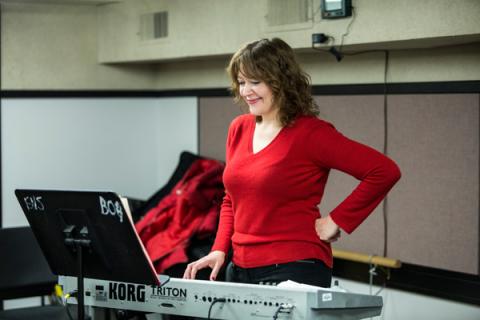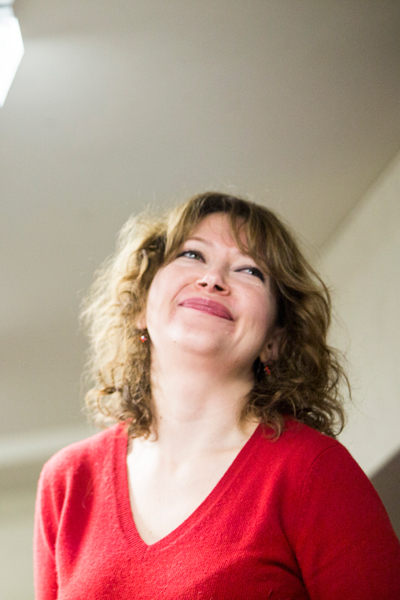Student Profile: Tanja Utunen

Tanja Utunen<br>
Major: Songwriting<br>
Instrument: Piano<br>
Hometown: Tampere, Finland
Photo by Kelly Davidson

Tanja Utunen
Photo by Kelly Davidson

Utunen rehearses with the Stewart Taylor Band in a Berklee practice room.
Photo by Kelly Davidson
After a childhood spent playing classical piano and singing in choirs in Finland, Tanja Utunen decided to get a “real job.” She got an M.B.A. in finance and spent 15 years as an investment officer at the International Finance Corporation, the private arm of the World Bank, most recently doing forestry investments in Africa. Then she decided she couldn’t live without music in her life and left all of that behind to enroll as a songwriting major at Berklee.
Utunen spoke to us about making such a drastic change in her life and how it's forever transformed her songwriting. The following is a condensed and edited version of that conversation.
Why did you decide to transition from the World Bank to Berklee?
After about 10 years into my career at the World Bank I felt like something was missing. I started writing songs and taking piano classes again, but never felt like I was able to write and play enough because of my job. I would wake up at 5:30 a.m. to squeeze in a little bit of music and songwriting before I had to go to work.
I joined NSAI, a songwriting organization in Nashville, and they have several regular events that they organize every year for intensive songwriting classes. During one of these workshops I took a couple classes with Pat Pattison, and his approach was so unique that I thought, 'If this is the quality of the teachers at Berklee, then that’s where I really want to go.'
It was a really scary process to quit and give up the regular paycheck and any certainty as to what’s going to happen with your life. So it was a big step. Then when I came here and started classes, it was perfect. Everything feels like it’s taking me in the right direction; it feels like I'm in the right place.
What struck you about Pat Pattison’s approach?
His approach is very technical but at the same time it makes so much sense, and when you start using his tools you actually write better. He talks a lot about phrasing, and the stresses, and the way you set the lyrics to the music. Also his object-writing approach and really getting deep into visualizing things. I had gotten one of his books before I met him, Writing Better Lyrics. It made me realize that there’s so much more that goes into writing great songs that I hadn’t even realized. It was like a whole new world had been opened to me.
Why did you decide to focus on songwriting rather than performing?
I have horrible stage fright. I mean horrible. Even going through the proficiencies, it’s such a mental ordeal for me. Regardless of how well I know something, when it’s a performance situation, I absolutely hate it. I also feel like I’m not the best interpreter of my own songs. I know that somebody else can sing this so much better.
What have been some of your favorite classes since you’ve been here?
In fall 2012, I auditioned and got into Kara DioGuardi's Hit Songwriting class, and that was the best class I have taken at Berklee so far. She split us in songwriter/producer teams and we wrote and fully produced a new song almost every week. Learning to work closely with other writers as well as producers, under tremendous time pressure, was the best experience ever and was good preparation for the 'real world,' since that is how the industry works—it's all about cowriting. After that class, I don't even like writing just by myself anymore, because I love the bouncing back of ideas in a cowriting situation. And of course working with producers is great, because you walk away with a finished product.
"Architect" was composed in Hit Songwriting, with writers Tanja Utunen, Jess Newham, Esteban Calderon, and John Silos and producer/vocalist John Silos.
I loved Guitar Techniques for Songwriting with Steve Kirby. I think as a songwriter it helps to be able to compose on different instruments. When I write a song on the guitar, it is a completely different song than I would write at the piano.
What's next for you?
This summer I'll be going to Los Angeles to do an internship with a multiple-Grammy-winning producer, Jeffrey Weber, and cowrite as much as possible while I'm there. There are a lot of Berklee alumni in L.A., and I'm looking forward to getting to know the community.
Do you see other older students here at Berklee?
I was a member of the Atypicals' Alliance, which is the older student club. But the meetings always had very few people. I was part of the older students peer group—the first semester they put you in groups with similar students—so there were a few people there, but not that many. Maybe 1% of the total population.
Talking to my friends and previous colleagues, there’s a lot of people these days who have had careers, who have had kids, who are wondering, ‘What do I do with the second part of my life?’ I got an email from a woman who has raised her kids, she’s 40 years old, and she’s thinking about music school. I’m seeing a lot of people being discontented with what they have been doing and realizing, ‘Maybe there’s something else that I can do with my life.’ But there are also so many people that are just scared of making the move. They’re too scared to take the risk, and that’s so sad. I decided to take the risk and change my life completely, because I only have this one life and I want to make the most of it. I want to wake up every morning excited about what I am doing. Life really only begins when you get out of your comfort zone.
